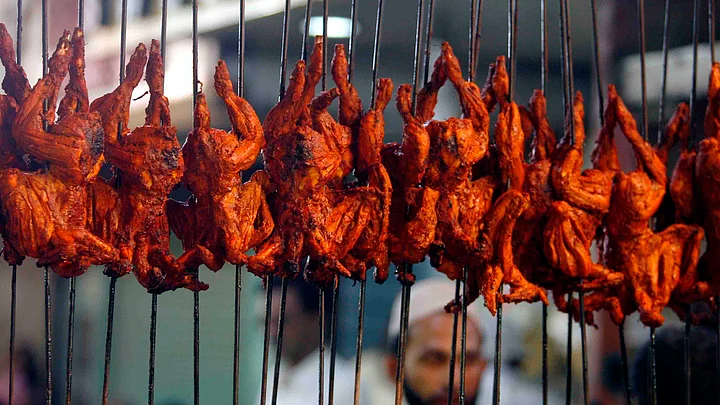(The following article is being republished from The Quint’s archives in the light of the ongoing debate around the ban on cattle sale for slaughter. It was originally published on 1 February 2017.)
Eating meat is bad for the environment. Cow farts release methane, a gas that heats up the planet more rapidly than carbon dioxide. Livestock farming often means cutting down large portions of ancient forests in Brazil, Indonesia or India. You know all of this already. But what if we told you that giving up eating meat doesn’t help the environment much either?
Researchers from Sheffield Hallam University say that certain vegetables have a higher carbon footprint than certain meats. The carbon footprint of food is the amount of carbon dioxide that goes into the production process.
The researchers also found that growing vegetables is not always sustainable.
Researchers say we should refrain from generalising our meats and vegetables. A recent study from Carnegie Mellon University found that lettuce has three times the carbon footprint as bacon. That means you’d be doing the planet a favour if you ate more bacon instead of salad.
It’s not just lettuce. The study also found that eggplant (brinjal), celery and cucumbers have particularly high carbon footprints.
Additionally, many of the fruits and vegetables we love take up large land areas. Avocados, for example, are responsible for major deforestation in Brazil's Amazon rainforest.
Rice may be a staple in most Asian households, but it is also one of the biggest sources of methane production. However, since approximately 3.5 billion people rely on it for survival, it is unlikely that the environmental hazards of rice cultivation will raise alarm any time soon.
Recent studies show that there is huge wastage in the agricultural sector. According to the Food and Agriculture Organisation, around one-third of food produced around the world (around 1.3 billion tonnes) goes bad before it makes it to the market. And only a small portion of the produce that makes it to the markets is actually sold. Researchers say fruits and vegetables are much more likely to get thrown away than meat and fish.
Additionally, if you’ve given up meat, you’ll need to consume a lot more vegetables to get your share of protein and energy. This translates into a lot more agricultural production.
If you stop eating beef, you can’t replace a kilogram of it, which has 2,280 calories, with a kilogram of broccoli, at 340 calories. You have to replace it with 6.7 kilograms of broccoli.Tamar Haspel, Oyster Farmer and Freelance Writer
Some types of meat, however, are still much worse than most vegetables. Beef is one of the worst types of meat, and while many people in India don't consume it, India is the world's largest exporter of beef.
The argument against meat-eating (keeping aside the moral issue of slaughtering sentient beings) tends to be this: the amount of land cleared to take care of livestock is much larger than agricultural land, so that reduces the number of trees.
The logic here is that trees can take carbon out of the atmosphere, so they can undo some of the damage we do by pumping loads of carbon dioxide in the atmosphere through our factories, cars and food production. If we cut them down to make more food, then we're losing out on the carbon-absorbing and air purifying benefits trees give us.
So What Can We Eat?
So what are some better ways to reduce your carbon footprint when you eat?
Eating locally grown food is one of the best options – even better if you grow some of the food yourself. That's because when you eat locally, you cut down on the transportation costs and the fuel required to truck or ship food across long distances.
That doesn't mean you shouldn't think about cutting down on the meat in your diet. Eating meat leaves behind a massive carbon footprint. And while there are a number of other reasons to cut meat out of your diet, this serves as a reminder that nothing in this world is clear cut.
